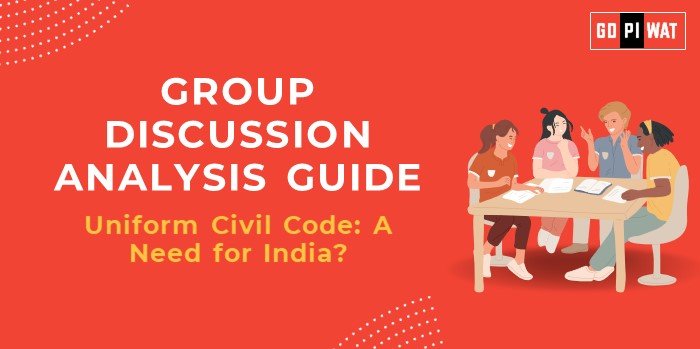📋 Group Discussion Analysis: Uniform Civil Code – A Need for India?
🌐 Introduction to Uniform Civil Code (UCC)
- Opening Context: The Uniform Civil Code (UCC) proposes replacing personal laws based on religious scriptures with a common set governing marriage, divorce, inheritance, and adoption for all citizens. Its relevance is heightened in India, a secular nation with diverse communities.
- Topic Background: The debate around UCC dates back to India’s constitutional drafting. Article 44 of the Directive Principles of State Policy advocates its implementation, emphasizing national integration while balancing religious freedoms.
📊 Quick Facts and Key Statistics
- 📜 Constitutional Mention: Article 44 of DPSP mandates efforts to implement UCC.
- ⚖️ Judiciary Support: Supreme Court judgments, such as the Shah Bano case (1985), have reiterated its importance.
- 🌍 Global Comparison: Nations like the USA and France follow uniform laws for all citizens, underscoring equality.
- 🌟 Current Progress: Goa is the only Indian state to follow a UCC since colonial times.
- 📊 Public Opinion: A 2022 survey found 60% of Indians support UCC implementation.
🧩 Stakeholders and Their Roles
- 🏛️ Government: Drives legislative initiatives and policy framing.
- ⚖️ Judiciary: Offers interpretations and directives promoting equality.
- ✝️ Religious Groups: Key influencers shaping community response.
- 👥 Citizens: Impacted directly, reflecting diverse perspectives.
- 🌐 International Observers: Highlight India’s secular and human rights commitments.
🏆 Achievements and Challenges
✨ Achievements
- ⚖️ Judicial Advocacy: Cases like Shah Bano (1985) and Shayara Bano (2017) emphasized the need for gender-equal laws.
- 🌍 Global Secular Model: Adoption of UCC aligns with democratic and egalitarian ideals.
- 🏅 State Implementation: Goa serves as an example of successful UCC application.
⚠️ Challenges
- 🙏 Cultural Sensitivities: Balancing personal laws with religious beliefs remains contentious.
- 🌏 Diverse Demographics: India’s heterogeneity complicates uniformity.
- ⚡ Political Polarization: Concerns over misuse for electoral gains.
- 🌐 Global Comparison: While secular countries like France have succeeded, others face backlash in enforcing uniformity.
🔍 Case Studies
- 🇮🇳 Goa UCC: Implemented seamlessly, providing a model for national adoption.
- 🇫🇷 France: Effective in ensuring equality but criticized for stifling cultural expressions.
💡 Structured Arguments for Discussion
- Supporting Stance: “UCC fosters gender justice, equality, and national integration by ensuring equal rights for all citizens.”
- Opposing Stance: “Enforcing UCC risks infringing on religious freedoms and could alienate minority communities.”
- Balanced Perspective: “While UCC promotes equality, its implementation must be sensitive to India’s pluralistic society.”
🎯 Effective Discussion Approaches
- 📈 Opening Techniques:
- 📊 Statistical Opening: “With over 60% public support, UCC presents an opportunity to strengthen national unity and gender equality.”
- ⚖️ Contrast Opening: “While Goa thrives under a UCC framework, challenges in replicating it nationwide persist.”
- 📜 Historical Reference: “The Shah Bano case reignited debates on gender justice and UCC in modern India.”
- 🤝 Counter-Argument Handling: Use constitutional provisions, global examples, and case studies to provide balanced rebuttals.
📌 Strategic Analysis of Strengths and Weaknesses
- Strengths: Promotes equality, simplifies legal frameworks, and ensures secular governance.
- Weaknesses: Potential cultural backlash, lack of consensus, and diverse societal norms.
- Opportunities: National integration, global alignment, and judicial endorsements.
- Threats: Political misuse, legal challenges, and minority apprehensions.
🎓 Connecting with B-School Applications
- 📘 Real-World Applications: UCC provides a foundation for legal, cultural, and policy-focused MBA projects.
- 🎤 Sample Interview Questions:
- 📖 “How can India balance UCC implementation with cultural pluralism?”
- 🌍 “What lessons can India learn from countries with uniform laws?”
- 💡 Insights for B-School Students: Understanding UCC aids in analyzing societal transformation and legal frameworks.


